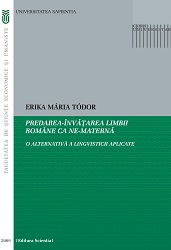Predarea-învăţarea limbii române ca ne-maternă. O alternativă a lingvisticii aplicate
The Teaching and Learning of Romanian as Non-Native Language. An alternative of applied linguistics
Author(s): Erika Maria Todor
Subject(s): Language and Literature Studies, Foreign languages learning
Published by: Scientia Kiadó
Keywords: national minorities; teaching; learning; Romanian language; non-native language; skills and competencies
Summary/Abstract: The present book is addressed to the teachers and would-be teachers who contemplate on the efficiency of the teaching-learning process in the context of studying the Romanian language in the schools and classes of national minorities, especially in those of the Hungarian minority. in these six chapters we approach social and linguistic moments of the reality, both in practice, focusing on its contrastive grammar connotations, and in its psycho-pedagogical relevance, as it is present in the schools. at the end we offer our readers a detailed list of definitions of the special notions used in this field. in the present book we used the notion “Romanian as non-native language”, first of all, in order to describe the phenomenon by means of a short and easy to use term, which also reflects the complex existence of the bilingual person in the context of institutional language acquisition in school context, preponderantly in schools with teaching language of national minorities. These subjects are from different, mostly monolingual background but also from bilingual or multilingual families. The term we use also has the advantage of attracting attention to the special character of the phenomenon, reflecting the fact that is has a very differing status from foreign languages. in this context the present text describes the optimal skills and competencies of any efficient teacher, clarifies basic notions and definitions of the institutional bilingualism, this latter's forms and errors and mistakes caused by different aspects of bilingualism, including their solving too. The text also refers to the outstanding didactic value of linguistic code switching. it is worth mentioning how bilingualism creates and constitutes meaning and sense, and what effects it has on the non-native language related reading and expressing actions. I consider that the present writing may constitute a premise to the elaboration of new textbooks, academic writings, and i hope the ideas formulated here will offer creative points of reference in the education and formation of teachers and would-be teachers.
Series: Jegyzetek
- Print-ISBN-13: 978-973-197-026-4
- Page Count: 152
- Publication Year: 2009
- Language: Romanian
- eBook-PDF
- Table of Content
- Introduction

